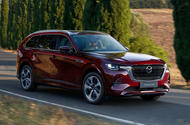The CX-80 is underpinned by Mazda’s Large Product Group platform
Volvo XC90 rival gets heightened practicality, class-leading towing capacity and a sportier chassis
Mazda is returning to the seven-seater market after a six-year absence with the CX-80, a luxurious new flagship SUV.
Closely related to the CX-60, the CX-80 is the first three-row Mazda in Europe since the 5 MPV and the second model to use Mazda’s Large Product Group platform. Compared with the CX-60, its wheelbase is 250mm longer and its rear roofline is 24mm taller.
Measuring 4995mm long, 1890mm wide and 1710mm tall, it is around the same size as the Volvo XC90 and Hyundai Santa Fe and is the largest car Mazda has launched in Europe.
With all seven seats in place, boot space is 258 litres, rising to 687 litres with the back row folded away and 1221 litres with the two rearmost rows stowed. In place of the three-seat bench, the middle row can be specified with a pair of captain’s chairs, which can recline up to 33deg.
The CX-80 will be launched here in the autumn, with power provided by the same range of engines as the CX-60. These include a mild-hybrid 3.3-litre straight-six diesel engine producing 250bhp and 406lb ft, giving a 0-62mph time of 8.4sec and a top speed of 136mph.
There’s also a plug-in hybrid, combining a 2.5-litre four-cylinder petrol engine with a 17.8kWh battery and electric motor. This produces 323bhp and 369lb ft, cutting the 0-62mph time by 1.6sec over the diesel. It achieves an electric-only range of 32 miles and emits 36g/km of CO2, putting it in the 12% benefit-in-kind tax bracket.
Both engines send their power through an eight-speed automatic gearbox to both axles, with a bias towards the rear.
Asked why Mazda has chosen to offer its new seven-seater with a pure-diesel option and no electric version, the company’s Europe R&D boss, Christian Schultze, said: “It is one of the opportunities to look at how customers live, and for us it was a logical extension and we think it is right. We are developing EVs for range, but we are not yet offering them because we have not yet found the final state of technology.”
Schultze added that the decision to launch a three-row SUV rather than an MPV – like the Volkswagen Touran – was made because “people think [MPVs] are just semi-commercial vehicles”.
He said: “People want to have something which is a bit more personal, like the CX-80. What is the benefit of an MPV? It’s just a slightly different top hat and the design is more boxy.”
Mazda says the platform has been engineered for optimal stability and comfort in “high-g situations”, touting the PHEV’s low centre of gravity – courtesy of its underfloor battery – as a particular asset in this regard. The CX-80 is also equipped with Mazda’s kinematic posture control system, which brakes the inside rear wheel in fast corners to mitigate body roll.
Meanwhile, additional bracing over the CX-60 boosts towing capacity of 2500kg, which puts it above the XC90 and matches the Santa Fe, and there’s a new trailer hitch view, which points a camera at the towbar to make it easier to connect a caravan or trailer.
Trim levels are identical to the CX-60’s and range from entry-level Exclusive Line, which is expected to start at £50,000, to top-rung Homura Plus cars which will cost around £56,000.
All models come with tri-zone air conditioning, a 12.3in infotainment screen, wireless smartphone mirroring and Amazon Alexa voice control as standard, plus a memory function that uses facial recognition to restore settings for a particular driver.







